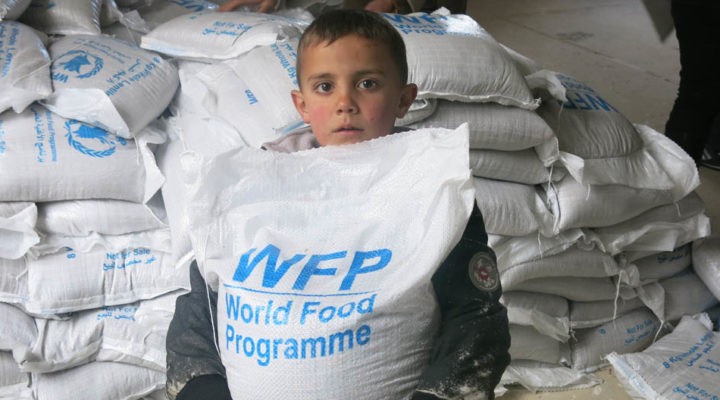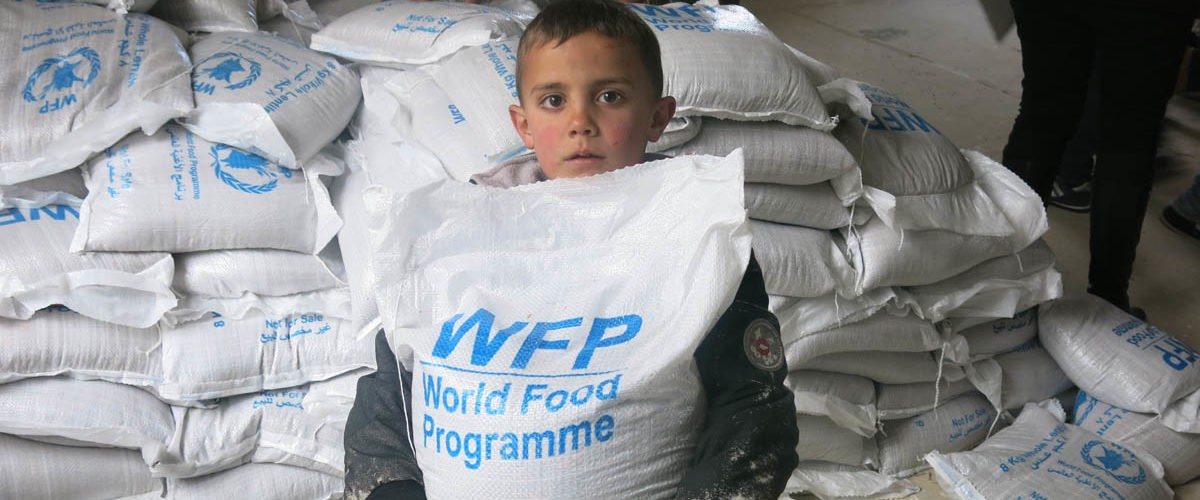Policies promoting global economic and food security will do far more to stem the tide of immigration than efforts to tighten borders and expel migrants, the world’s top anti-hunger official said during a Sept. 10 conference at Baylor University.
“People don’t want to leave home. But if they don’t have food for their children or any degree of safety or security, they’ll do what you would do for your family — they’ll go find it,” said David Beasley, the former Republican governor of South Carolina who now serves as executive director of the United Nations World Food Program.
Hunger, he added, “leads to the destabilization of nations and mass migration.”
Beasley was keynote speaker for the “Forum on Global Hunger” organized by the Baylor Collaborative on Hunger and Poverty and hosted virtually and in-person by the university’s George W. Truett Theological Seminary.
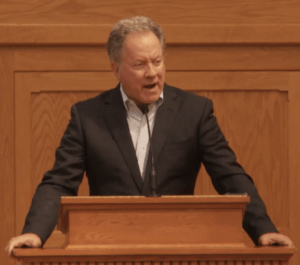
David Beasley
As South Carolina’s chief executive from 1995 to 1999, Beasley gained prominence for transforming the state’s economy and for being the state’s first governor to publicly campaign for the removal of the Confederate battle flag from the capitol dome in Columbia. The effort earned him the John F. Kennedy Profile in Courage Award.
In 2017, he took the helm of the U.N.’s leading global humanitarian agency that provides emergency aid, relief and rehabilitation assistance in 84 nations — two-thirds of them ravaged by war. Under Beasley’s leadership, feeding and development operations have skyrocketed to meet increasing demand caused by war, economic destabilization and the COVID-19 pandemic. The effort, and its effects in tempering misery and conflict, earned the World Food Program the Nobel Peace Prize in 2020.
In his Baylor address and in a follow-on session, Beasley emphasized the direct relationship between hunger, armed conflict and migration. He urged Americans to combat food insecurity in their own communities but also abroad to prevent the economic and political destabilization that contributes to U.S. domestic divisions, including those over immigration.
Beasley said he found the issue of hunger to be a politically unifying one.
When he lobbies the U.S. House and Senate, Democrats and Republicans stop their “fighting over everything” and ask ‘what can we do to help” the World Food Program, Beasley said. “They want to do something good.”
It also works with shady foreign political leaders and even with warlords and terrorists. Beasley said he recently met with the Taliban in Afghanistan to gain safe passage for aid convoys in that country since U.S. forces departed Aug. 31.
“We sit down with the bad guys and explain to them what we are doing and why we are doing it. They still respond to the goodness of helping innocent people.”
“The Taliban assured us and have kept their word that I can move that cargo through,” he said.
As human beings made in the image of God, extremists and corrupt government officials in other nations have an innate desire to prevent starvation, even when they have previously used hunger as a weapon of war, he said. “We sit down with the bad guys and explain to them what we are doing and why we are doing it. They still respond to the goodness of helping innocent people.”
Beasley said he’s been criticized for meeting with extremists to get shipments through. But it’s that or millions more starve, thus breeding further war, migration and global insecurity, he declared. “We have to negotiate with all sides. I have met with Taliban recently because if we walk away from Afghanistan, it will become the No. 1 breeding ground of extremism.”
The urgency of global hunger is another motivator for support, he said.

World Food Program food distribution in Aleppo, Syria. ()Photo: WFP/ Khudr Alissar)
The worldwide number “marching to starvation” hit 135 million just before the COVID-19 pandemic, due to man-made conflict, global climate extremes and unstable governments, he said. In 2020, those considered on the brink of starvation rose to 270 million due to the “economic ripple effect” of the pandemic supply chains.
Starvation killed 9 million people last year and is expected to kill 25 million in 2021, he added. “Where is the outrage? Where is the media coverage?”
Beasley also offered a religious appeal to motivate support for fighting hunger, tying the endeavor to Jesus’ call to feed and clothe the poor in Matthew 25.
In the passage, Jesus identifies himself with those in need and says that to ignore their needs is to neglect him. It’s the ultimate expression of loving neighbor as self, he said.
But for Beasley, the connection between “love thy neighbor” and feeding the hungry was deepened when a rabbi explained to him that, in Hebrew, the concept means loving neighbors as equals. “That’s when the lights came on,” he said.
The key to ending the life-threatening hunger faced by 10% of the world’s population is to take actions that demonstrate love of God and neighbor, Beasley said. “‘Love one another like I loved you. By this the world will know you are my disciple.’ Can you prove you are a disciple by your actions?”
Beasley said he tells world leaders, billionaires, politicians and extremists the same thing: Break bread and fellowship with opponents to model the actions Christ took with ordinary people to transform the Roman Empire.
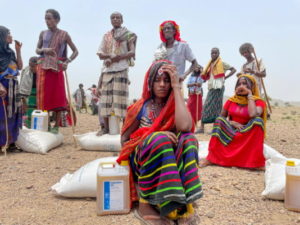
A general food distribution in Afar region, Ethiopia, where 107,000 people have been displaced by conflict so far and half a million people are in urgent need of food assistance. (Photo: WFP/ Claire Nevill)
Failure to do so will result in more hunger, more anger and more destabilized nations with repercussions for the rest of the world, including the U.S.
“Men and women in this nation are fighting each other unlike anything I have ever seen, and the biggest problem is forgiveness,” he asserted.
Forgiveness can begin with Americans seeing their opponents as well as the hungry as images of God, Beasley said, explaining that this is the same pitch he makes to heads of state and warlords around the globe. “Those who are led by the Spirit are children of God. They are not Republicans or Democrats or Baptists or Muslims. They are the children of God.”
Working to fight hunger on grassroots and wider levels can transform that theology into the action needed to “help end hunger and in turn end conflict and destabilization and mass migration,” he said.
But he added that starvation cannot be thwarted by governments or the U.N. alone. The help of the private sector is needed, including involvement by the world’s wealthiest individuals: “We need billionaires to step up. I don’t think they are hearing it.”
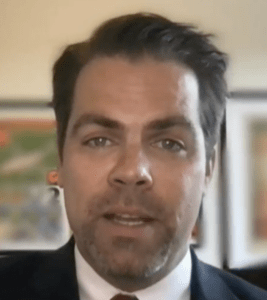
Adam Phillips
Religious groups also have a key part to play in the battle against hunger because of their vast networks of influence, said Adam Phillips, director of the Center for Faith-Based and Community Partnerships for the U.S. Agency for International Development.
Phillips said he’s seen Christian, Muslim and other religious aid organizations work together to multiply their “vast connections” to deliver food and other aid to those in desperate need around the world. “Faith-based organizations hold positions of special trust in societies wary of their own government and outsiders.”
Forum moderator Jeremy Everett, founder and executive director of the Baylor Collaborative on Hunger and Poverty, praised Beasley for his emphasis on action in working to end food insecurity, which he added is estimated to affect 40 to 50 million people in the U.S.
“We know we can do a better job of ensuring food for people all over the world,” Everett said.
Beasley said it is up to everyone to do that job, and everyone’s immediate involvement is needed because someone dies of starvation every three to four seconds: “How many are going to die from hunger while we sit here?”
Related articles:
Baylor initiative feeds 270,483 children in 43 states amid a global pandemic

